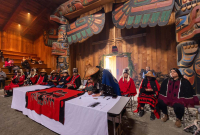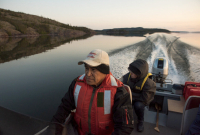Support strong Canadian climate journalism for 2025
A coalition of coastal First Nations and scientists are frustrated with Fisheries and Oceans Canada roadblocks to long-standing plans to create a network of marine protected areas on the West Coast.
For more than a decade, 17 coastal First Nations and the B.C. government have been actively involved in a marine planning process called MaPP to create the B.C. Northern Shelf Marine Protected Area Network — a patchwork of MPAs across the northern third of B.C.’s coast, said Mike Reid of the Heiltsuk Nation’s integrated resource department.
The Haíłzaqv, Kitasoo Xai'xais, Nuxalk and Wuikinuxv First Nations, represented by the Central Coast Indigenous Resource Alliance (CCIRA), have invested heavily in terms of time and money in scientific and traditional research into their MPA areas and at the negotiating table, Reid said.
“After spending 15 years now on the MPA process and then having DFO kind of stall the whole thing is challenging,” Reid said.
Particularly given the federal Liberal government’s repeated commitments to protect 30 per cent of Canada’s oceans by 2030, increasing First Nations’ decision-making and stewardship in their territories, and shifting to an ecosystem-based approach to managing resources, Reid added.
“It’s surprising (DFO) has this mandate … (and) they don’t actually take it to heart, or they don't actually engage in a way to fulfil that mandate,” he said.
The biggest sticking point is fishing management in the MPA areas, Reid said.
The nations’ priorities, which align with the basic rationale for marine protected areas, are to conserve and protect fish, along with other marine creatures and their ecosystem, and mitigate climate change, Reid said.
While some fishing restrictions are proposed for some MPAs, measures would vary according to the conservation objectives of each area, he said.
But it appears DFO is resisting proposed fishing regulations and doesn’t want to relinquish decision-making on fisheries in MPAs and instead wants to maintain the status quo, Reid said.
“We’re not working to just protect water,” he said of the First Nations’ goals.
“That's not our intent. We want broad ecosystem and biodiversity protections for species.”
While the B.C. government has been actively involved in the lengthy marine planning process, participation by DFO Pacific Region fisheries management has been spotty, Reid said.
Despite attempts to engage and get feedback from DFO’s Pacific fisheries branch, little was offered, he added.
“Throughout the whole process, fisheries management, and DFO in general, were actually absent from our whole process,” he said.
“Despite several attempts to engage them, it was for the most part fruitless.”
When the Central Coast section of the MPA plan was slated for release for public input, DFO’s Pacific Region management said they couldn’t support it and withdrew from the process in December, Reid said.
DFO just returned to the table this month, he said.
Before preparing the draft MPA plan for public input, feedback from conservation groups and the commercial fishing sector resulted in a 40 per cent reduction of potential cost impacts from the displacement of fisheries, CCIRA reported.
But as a condition of returning to the MPA process, DFO has asked for the proposed fishing regulations to be removed from the draft plan before it goes out for public input, Reid said.
“One of the things that they've proposed was to move the discussion on the management measures to the implementation stage,” he said.
“So it's actually not fixing the problem, it's just putting it further down the line.”
Public feedback on a draft plan without fishing management proposals won’t be very informed or useful if people can only look at MPA boundaries on a map, he added.
DFO Pacific Region responses to questions about First Nations’ concerns with the MPA process and its public feedback plan were not provided to Canada’s National Observer before its publication deadline.
Fisheries Minister Joyce Murray’s office said in an email that the federal government is determined to achieve its mandate to protect 25 per cent of Canadian oceans and waters by 2025 and 30 per cent by 2030.
“We have worked closely with provincial, territorial and First Nations partners to advance work on the Northern Shelf Bioregion,” the ministry’s press secretary Claire Teichman said.
“We continue to work closely with Indigenous Peoples to develop a collaborative governance model for MPA Network implementation and management.”
The minister’s office did not clarify whether DFO Pacific fisheries management decisions were undermining the federal government’s ocean protections mandate.
The Central Coast nations are on the front lines and suffer culturally and economically from drastic declines of keystone species due to overfishing and the mismanagement of resources and fish stocks, Reid said.
The crippling or significant declines of salmon, herring, rockfish, Dungeness crab, eulachon, kelp and other seaweeds, and northern abalone will continue to be exacerbated by climate change, he said.
On Tuesday, it was a scorching 33 C outside his front door in Bella Bella, which doesn’t typically get hot weather, Reid said
“I grew up here and it was never like this. We're seeing crashes of different species through our territory,” he said.
An MPA network on the Central Coast will likely boost fisheries in areas adjacent to protected areas as marine life and ecosystems bounce back, he said.
The last thing people want to experience is a similar scenario to the collapse of cod stocks on the Atlantic coast, he added.
“One thing I’ve tried to stress is that … (MPAs) are an investment in ourselves, our children and grandchildren and the future of B.C. and Canada,” Reid said.
“If things continue the way they are now, without any areas where (marine) species have a chance, the crash here could be huge.”
Rochelle Baker / Local Journalism Initiative / Canada’s National Observer






Comments